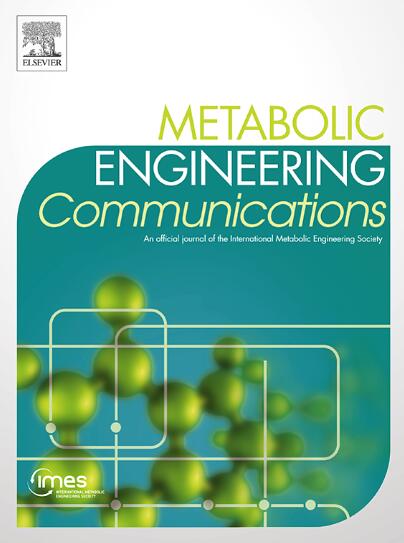Genetically encoded biosensors for the circular plastics bioeconomy
IF 4.1
Q2 BIOTECHNOLOGY & APPLIED MICROBIOLOGY
引用次数: 0
Abstract
Current plastic production and consumption routes are unsustainable due to impact upon climate change and pollution, and therefore reform across the entire value chain is required. Biotechnology offers solutions for production from renewable feedstocks, and to aid end of life recycling/upcycling of plastics. Biology sequence/design space is complex requiring high-throughput analytical methods to facilitate the iterative optimisation, design-build, test-learn (DBTL), cycle of Synthetic Biology. Furthermore, genetic regulatory tools can enable harmonisation between biotechnological demands and the physiological constraints of the selected production host. Genetically encoded biosensors offer a solution for both requirements to facilitate the circular plastic bioeconomy. In this review we present a summary of biosensors developed to date reported to be responsive to plastic precursors/monomers. In addition, we provide a summary of the demonstrated and prospective applications of these biosensors for the construction and deconstruction of plastics. Collectively, this review provides a valuable resource of biosensor tools and enabled applications to support the development of the circular plastics bioeconomy.
用于循环塑料生物经济的基因编码生物传感器。
由于气候变化和污染的影响,目前的塑料生产和消费路线是不可持续的,因此需要对整个价值链进行改革。生物技术为可再生原料的生产提供了解决方案,并帮助塑料的报废回收/升级回收。生物序列/设计空间是复杂的,需要高通量的分析方法来促进合成生物学的迭代优化、设计-构建、测试-学习(DBTL)周期。此外,遗传调控工具可以使生物技术需求和选定的生产宿主的生理限制之间的协调。基因编码的生物传感器为促进循环塑料生物经济提供了一个解决方案。在这篇综述中,我们总结了迄今为止报道的对塑料前体/单体有反应的生物传感器。此外,我们还概述了这些生物传感器在塑料构造和解构方面的应用。总的来说,这篇综述提供了生物传感器工具的宝贵资源,并使应用能够支持循环塑料生物经济的发展。
本文章由计算机程序翻译,如有差异,请以英文原文为准。
求助全文
约1分钟内获得全文
求助全文
来源期刊

Metabolic Engineering Communications
Medicine-Endocrinology, Diabetes and Metabolism
CiteScore
13.30
自引率
1.90%
发文量
22
审稿时长
18 weeks
期刊介绍:
Metabolic Engineering Communications, a companion title to Metabolic Engineering (MBE), is devoted to publishing original research in the areas of metabolic engineering, synthetic biology, computational biology and systems biology for problems related to metabolism and the engineering of metabolism for the production of fuels, chemicals, and pharmaceuticals. The journal will carry articles on the design, construction, and analysis of biological systems ranging from pathway components to biological complexes and genomes (including genomic, analytical and bioinformatics methods) in suitable host cells to allow them to produce novel compounds of industrial and medical interest. Demonstrations of regulatory designs and synthetic circuits that alter the performance of biochemical pathways and cellular processes will also be presented. Metabolic Engineering Communications complements MBE by publishing articles that are either shorter than those published in the full journal, or which describe key elements of larger metabolic engineering efforts.
 求助内容:
求助内容: 应助结果提醒方式:
应助结果提醒方式:


